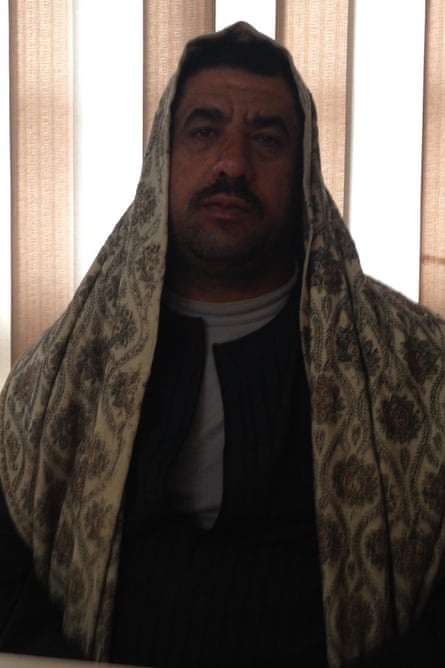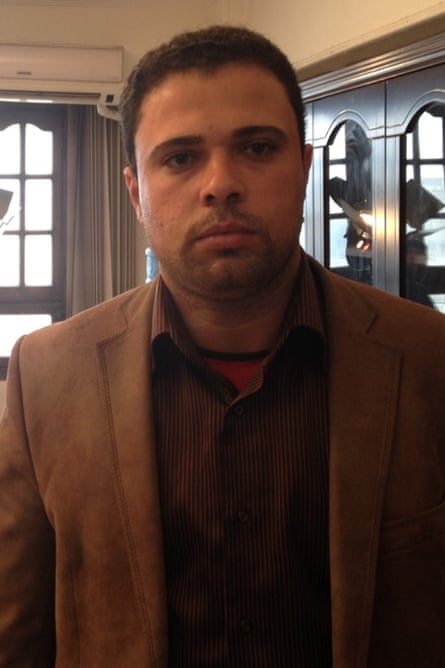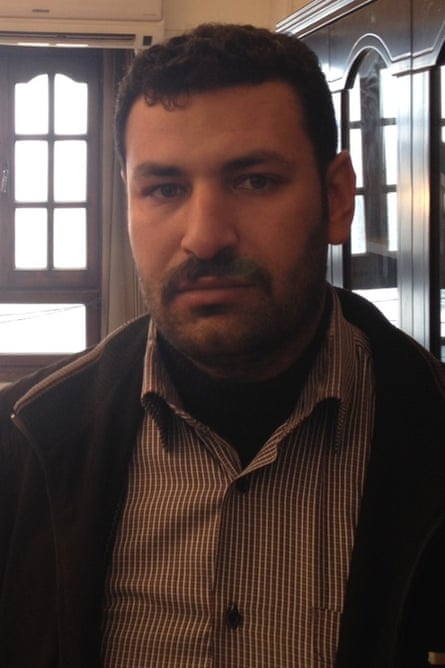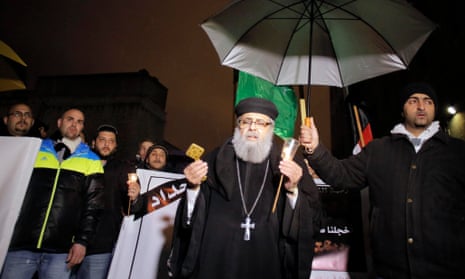In late August, armed, masked men stopped a car carrying Egyptian workers near the Libyan city of Sirte. Identifying each passenger by religion, the gunmen took the four Christians prisoner: three brothers and their cousin. The others – all Muslims – went free.
“The driver tried to negotiate, but they pulled a gun in his face,” Wagih Matta Hakim told the Guardian in an interview in Cairo this week. Another Egyptian worker, who managed to return home, told him that his brothers had been captured.
The four captives – Jamal Matta Hakim, Ra’if Matta Hakim, Rumana Matta Hakim, and their cousin, Adel Siddiq Hakim – were construction workers living in Tripoli, who had been in Sirte en route back to Egypt. They too had been trying to return home.
Unlike the 21 Coptic Christian hostages executed in a graphic video that was released last Sunday by Islamic State (Isis) militants, no evidence has surfaced to establish who is holding the men. The captors have not contacted their families, nor released any public statements, but Hakim still believes his brothers and cousin are alive.

They are among at least seven Egyptians – six Christians and one Muslim – who are believed to be held hostage in Libya, though that is regarded as a conservative estimate. Copts make up the largest Christian community in the Middle East, with an estimated 10-15 million members in Egypt. The precise motives for the abductions is not known, but they come in the context of escalating attacks on Egyptians in Libya, Copts in particular.
The three Hakim brothers were captured before local Libyan militia groups publicly declared their allegiance with Isis, the jihadi group that seized control of large portions of Syria and Iraq last year. Whatever the identity of their captors, the three are victims of the lawlessness and chaos that has engulfed much of Libya four years since the armed revolt that ousted dictator Muammar Gaddafi.
Hakim, along with relatives of other Egyptians missing or believed to be held captive in Libya, met with officials at Egypt’s ministry of foreign affairs on Thursday morning, one of several such meetings in recent months.
Afterwards, the group of more than a dozen men sat sullen, drinking tea from plastic cups in the offices of the Egyptian commission for rights and freedoms.
They have been critical of the government’s response, which they say has been slow and opaque. Officials told the group that Egypt is working through local contacts in Libya to locate and free hostages. “There was no response,” Hakim said of the foreign ministry’s efforts.
In response to the videotaped execution of the 21 hostages, Egypt’s president Abdel Fattah el-Sisi ordered airstrikes on Monday on what the military said were Isis fighters’ training sites and weapons stockpiles in eastern Libya.

The raids marked the first time the Egyptian government has officially engaged in military action in four years of crisis in Libya. Dozens of fighters were killed in the strikes, according to Egyptian and Libyan authorities, while Human Rights Watch reported the names of six civilians killed.
On Friday, three car bombs exploded in the eastern Libyan city of Qubbah, killing 40 people and wounding 70. Libya’s parliamentary speaker, Aguila Saleh, said the bombs appeared to have been in retaliation for Egyptian air strikes on nearby Derna, an Islamist militant stronghold.
But in the aftermath of the airstrikes, officials and ordinary Egyptians worry about the repercussions for the estimated 1.5 million Egyptians living and working in Libya.
“Sisi’s military action is good for the people, but we want our sons back,” said Hakim.
Libya’s once-burgeoning oil economy made the country a top destination for Egyptian workers. Even in recent years of instability, Libya was regarded a place of more plentiful jobs and higher wages; Egyptians working there sent millions of dollars home in the form of remittences, according to the International Organization for Migration. Many of the captives come from some of Egypt’s most poorest areas, in the south of the country. Among the group of 21 murdered hostages, at least two were painters, another a plumber.
Libya’s state institutions, already plagued by decades of misrule under Italian colonialism, a monarchy, and Gaddafi’s regime, have been further eroded by four years of upheaval. The country is now divided between two rival governments and a multiplicity of armed groups who exert control at the local level.
As a result of the complex realities on the ground, relatives of the other missing Egyptians know they may also face a grim fate.

Shenouda Adly, 29, and Abdel Fattah El Beheiri, 27, had both lived in Libya for more than seven years before they disappeared in September. According to their friends and relatives, the two left their workplace, a small marble cutting factory in the city of Misrata, on 15 September, and never returned. Their co-workers at the factory searched local police stations and hospitals, but the two were nowhere to be found. The other workers surmised they had been abducted.
According to Adel Yacoub Hanna, 31, who worked at the same factory, the disappearance was unexpected. The two had numerous close Libyan friends and colleagues. Adly in particular, he said, was highly respected in Misrata for his craftsmanship. “In the period before the kidnapping, we felt no threat,” he said. Hanna, who is from Egypt’s Minya province, blamed a local mafiosi, but no concrete evidence surfaced to clearly establish who was behind the disappearance.
Egypt’s government says it has been organising operations to help evacuate the Egyptians still in Libya, and Egypt Air has said it is prepared to offer aircraft and crews to help aid a potential airlift. In a statement announcing the airstrikes on alleged Isis targets, an Egyptian armed forces spokesman said: “Let those far and near know that Egyptians have a shield that protects them.”
But for many, the action comes too late. Shenouda’s brother, Samuel Adly, also characterised the government’s response, prior to the air strikes, as muted.
“They just tell us they’re trying to communicate with people on the ground in Libya, but there has been no result so far,” he said.
Fearing for his own safety, Hanna returned to Egypt after 12 years living in Misrata and the city of Zleitan, in Libya. “The ministry of foreign affairs failed to bring these people back. The military acted, but only after people were killed,” he said.








Comments (…)
Sign in or create your Guardian account to join the discussion